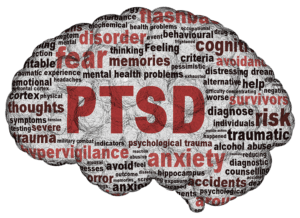A cell membrane bionic delivery system for CBD assisted with ultrasound “had good therapeutic effect against PTSD mice”, and may help to “alleviate the symptoms of PTSD.”

Photo credit: Forbes
This is according to a new study published by the International Journal of Pharmaceutics. The study was conducted by researchers at the Shandong University of Traditional Chinese Medicine, the Beijing Institute of Radiation Medicine, Henan University, Hebei University and the General Hospital of Western Theater Command. The study is titled Cannabidiol–loaded biomimetic macrophage membrane vesicles against post–traumatic stress disorder assisted by ultrasound.
“Our previous studies proved the effectiveness of cannabidiol (CBD) against PTSD, but low water solubility, low brain targeting efficiency and poor bioavailability restricted its applications”, states the study. “Here, a bionic delivery system, camouflage CBD–loaded macrophage–membrane nanovesicles (CMNVs), was constructed via co–extrusion of CBD with macrophage membranes, which had inflammatory and immune escape properties.”
In vitro anti–inflammatory, cellular uptake and pharmacokinetic experiments “respectively verified the anti–inflammatory, inflammatory targeting and immune escape properties of CMNVs”, states the study’s authors. “Brain targeting and excellent anti–PTSD effects of CMNVs had been validated in vivo by imaging and pharmacodynamics studies.”
In the study “the potential of ultrasound to open BBBs and improve the brain–targeted delivery of CBD was evaluated.”
Researchers conclude: “In conclusion, this cell membrane bionic delivery system assisted with ultrasound had good therapeutic effect against PTSD mice, which is expected to help convey CBD to inflammatory areas within the brain and alleviate the symptoms of PTSD.
The study’s full abstract can be found below.
Abstract
Post–traumatic stress disorder (PTSD), which normally follows psychological trauma, has been increasingly studied as a brain disease. However, the blood–brain barrier (BBB) prevents conventional drugs for PTSD from entering the brain. Our previous studies proved the effectiveness of cannabidiol (CBD) against PTSD, but low water solubility, low brain targeting efficiency and poor bioavailability restricted its applications. Here, a bionic delivery system, camouflage CBD–loaded macrophage–membrane nanovesicles (CMNVs), was constructed via co–extrusion of CBD with macrophage membranes, which had inflammatory and immune escape properties. In vitro anti–inflammatory, cellular uptake and pharmacokinetic experiments respectively verified the anti–inflammatory, inflammatory targeting and immune escape properties of CMNVs. Brain targeting and excellent anti–PTSD effects of CMNVs had been validated in vivo by imaging and pharmacodynamics studies. In our study, the potential of ultrasound to open BBBs and improve the brain–targeted delivery of CBD was evaluated. In conclusion, this cell membrane bionic delivery system assisted with ultrasound had good therapeutic effect against PTSD mice, which is expected to help convey CBD to inflammatory areas within the brain and alleviate the symptoms of PTSD.
Graphical abstract
Purified macrophage membranes were obtained by ultrasound fragmentation of the probe followed by sucrose gradient centrifugation and finally co-extrusion with Cannabidiol (CBD) to obtain CBD-loaded macrophage-membrane nanovesicles (CMNV) of about 200 nm. After sonication process on the brain, CMNV was injected into the mice via vein injection. Several mechanisms may help to explain that the nanoscale particles CMNV to cross the BBB and reach the mouse brain to play a role. Firstly, the mechanical effect of sonication opens the BBB. Secondly, the inflammatory response in the mouse brain can also drive the nanoparticle drugs to cross the BBB. Thirdly the nanoparticle size of CMNV and the specific macrophage membrane proteins contained on its surface facilitate it crossing BBB.

